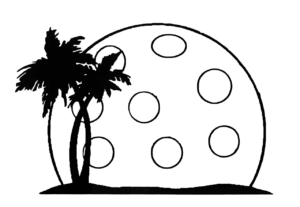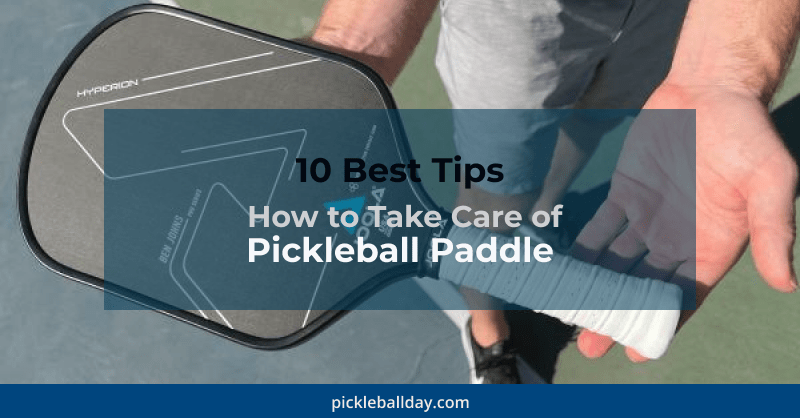You have heard it a thousand times. Your paddles are the first and most essential part of your pickleball game. A suitable paddle assists in winning, and the enjoyment and fun on the court depend on it greatly. Thus, choosing the right pickleball paddle means something you need to accomplish before hitting the court.
Now, the question is it enough to have only the most suitable paddle? Doesn’t it need good care to keep it in shape and to perform?
Many beginners only think about seeing the paddles last longer but do not know how to take adequate care of them. Remember, repairing a pickleball paddle is not effortless and might not restore your paddle as it was before it got harmed. Therefore, taking care and keeping the paddle in good shape should be their priority.
Table of Contents
- 1 Do Your Pickleball Paddles Need Care?
- 2 Why Should You Take Proper Care of Your Paddles?
- 3 How to Take Care of Your Pickleball Paddles
- 4 How to Take Care of Pickleball Paddles Inside Court
- 5 How to Take Care While Carrying Out
- 6 How to Keep a Pickleball Paddle Safe from Heat and Humidity
- 7 How to Take Care of Your Pickleball Paddle’s Edge Guard
- 8 How to Take Care of Your Pickleball Paddle Grips
- 9 How to Clean Your Pickleball Paddle
- 10 6 Best Tips on Taking Care of Pickleball Paddles
- 11 Frequently Asked Questions on Taking Care of Pickleball Paddles
- 12 Final Verdict
Do Your Pickleball Paddles Need Care?
Like any other pickleball equipment, your paddles also need regular care and maintenance. Of course, you can opt for a new one every time you find your paddle is bad, but very few paddles might win your heart with their overall performance. So, to make your favorite bat stable, there is no substitute for enough care.
Why Should You Take Proper Care of Your Paddles?
A paddle has a solid lifespan; it will get old over time whether you use it or not. And you can not prevent that. While it starts to wear out, its performance gradually declines. So, as a pickleball lover, you should aim to make your favorite paddle long-lasting. Proper care is the only thing that can ensure the paddles are in good shape for a long time. Besides, handling it with care will extend its lifespan.
How to Take Care of Your Pickleball Paddles
Taking care of pickleball paddles does not mean only cleaning them from time to time or buying a fancy bag to hang them in. It includes a lot of basic things. And like any other piece of equipment, your paddle needs care inside and outside the court.

How to Take Care of Pickleball Paddles Inside Court
If you want to have a fit paddle, you can follow these steps inside the pickleball court:
- Don’t Lift: Never use the paddles to lift pickleball from the ground. It’s the first rule and is a must-to-do for all, from novices to pros. When you try to lift balls or anything from the ground using your bats, the edge tape gets scratched and loose. Besides, they might become unable to keep the paddle edges firm and fit.
- Hit the Balls only: You see the players touch each other’s rackets as a show of sportsmanship. While this hit will not have any remarkable influence on a tennis racket, it might injure the pickleball paddle’s surface material or top layer, including the cores. Therefore, hitting any other objects except the balls is not a good option at all.
- Avoid Clashes: Pickleball paddles are not fragile. They are solid enough to hit the balls and absorb the shocks. But, paddles are not super strong like a tennis racquet. So, avoid clashes at any cost. The great shock from a clash with your partner or opponent’s paddle might break it. But even if it does not break in a clash, the shape of the hitting area will be destroyed.
- Don’t Roll: Paddles are best for returning the shots. Though it may seem that rolling the balls with your paddle will not make them weak (after all, you are touching the balls like a drive), do not intend to do that. The honeycomb cores of the pickleball paddle are good for shots, not for rolling balls on the ground.
- Don’t Throw: Don’t throw or hit the paddles to the ground or net, which some players do in grudge. Those paddles are not the objects you should use to get rid of your anger.
- Don’t Drop: Dropping the paddle accidentally during the game is a major cause of their short lifespan. The paddles get cracked easily from falling on the hard ground. Securely bind the laces (fixed at the handle cap) around your wrist.
- Don’t Stand: Players keep their extra paddles and other equipment on the courtside. It can be a serious injury to the equipment if you or anyone else mistakenly stands on the paddles. Besides, there is the risk that someone may walk on the equipment. In both cases, your paddles are going to be seriously damaged. And you might need a new one.
- Avoid Hot Sun: Don’t keep your paddles in direct sunlight. There is glue inside that keeps cores, surface materials, and edge guards bonded together. Heat might affect the bonding strength, which will end up losing attraction between the materials.
How to Take Care While Carrying Out
Don’t keep your paddles under heavy objects. For example, while you carry the paddles in your gym bag, keep them on top of all other things, so they do not have to carry the load.
When carrying them in the car, you should be careful not to keep anything, either lightweight or heavy, on them. Also, be careful not to step on them.
How to Keep a Pickleball Paddle Safe from Heat and Humidity
Extreme heat and cold weather can decrease the quality of paddle materials. You should keep them safely inside your home or garage, away from hot, cold, and humid air.
In the summer months, long exposure to the hot sun on the paddles causes a great loss to them. The heat makes the core and surface materials soft, weakening the overall bond between them. As a result, the paddle becomes less usable with reduced control, power, and spin.
During the winter, try to keep it in a warm place inside the home or car. The inner core materials lose their features in the cold, and you will not get the real function on the court. The freezing temperature even causes the paddles to break quickly.
How to Take Care of Your Pickleball Paddle’s Edge Guard
A pickleball paddle’s lifetime depends a lot on the edge guard. It keeps the paddle safe from unwanted hits. Whenever the edge protector gets a single scratch, it loses its lifespan every time. So, try your best to keep the edge guard intact as long as possible.
However, over time, the edge guard starts to extend and get loose. In this case, you can either restore the edge guard using contact cement or fix it with new tape.
How to Take Care of Your Pickleball Paddle Grips
A comfortable and well-fit pickleball paddle grip is crucial for all the creative shots on the court. It takes all the pressure off inside the court. Besides, they are designed to absorb sweat. As a result, after every game, they become dirty and smelly.
However, it’s easy to clean the grips. Use a wet towel to remove any dirt and stains from the grips. And sometimes you need to replace them. After a certain period, like 50 to 100 active hours, they might get old enough to hold the handles. Then it’s time to replace; get a new one and regrip.
How to Clean Your Pickleball Paddle
Cleaning is a major part of the care process for your paddles. Clean them regularly. This practice will not only keep them in good health and fit but also extend their lifetimes.
Every time you use them, clean the paddles from the body to the handle. Simply, a piece of cloth and a cleaning agent like glass cleaner are enough to keep them neat and fit. Read this detailed guide here on how to clean your paddle.
6 Best Tips on Taking Care of Pickleball Paddles
- First of all, use a dedicated paddle bag. The bag should be the exact size of that paddle. Do not use a loose bag from another paddle or an unused, oversized tennis bag.
- The weather has a great influence on paddles. You should not keep them in garages or your car’s trunk. Keep them in a warm, humid-free place inside your home.
- Don’t keep it on the floor. There are chances of its distortion from inadvertence. Keep it in a paddle bag and hang it on the wall.
- If you carry your extra paddles in court, you should not keep them on the floor along the courtside. There is a fear of accidentally stepping on them. Try to use a bench to keep extra equipment.
- Do not make a habit of putting other things inside the paddle bag. If it’s a sharp object, it’s obvious to have some ugly scratches on the paddles.
- Pickleball is a social game. Do not pour your emotions on your paddles; rather, concentrate on the fun and engagement.
Frequently Asked Questions on Taking Care of Pickleball Paddles
Q1: Does a pickleball paddle make a difference?
A: Yes, besides your skill, a paddle can also make the difference between you and your opponents. A lightweight paddle gives more control on the shots while not being able to assist in more drive. On the other hand, a heavy paddle delivers more power and drive but is limited to less control. Besides this, paddles made of different materials have unique benefits for your playability.
Q2: What is the lifespan of a pickleball paddle?
A: The average lifetime of a pickleball paddle is about 1 to 5 years. However, it depends on various conditions, including the material quality, usage frequency, and your playing style. Taking proper care of it can extend its lifespan as well.
Q3: Do pickleball paddles get old or worn out?
A: Yes. Whether you use it or not, a paddle ball gets worn out over time. However, you can keep it in good shape and extend its life through proper care.
Q4: Does cold weather affect pickleball paddles?
A: Yes. Extreme cold weather has a bad impact on paddle materials. The core and the surface both lose their qualities. And in extreme cases, the paddles might break.
Final Verdict
A fit paddle is the first thing you should take care of. After that, cleaning regularly and maintaining good practices are adequate for the best output.
And life goes on. If it gets badly hurt, a local shop can restore it. However, if it becomes unfit for repair, go for a new one. I hope you have found this article helpful, and now you can take the right care of pickleball paddles.


